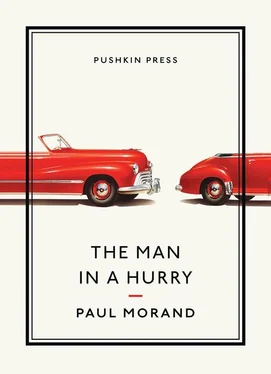Pierre set off for America like a cannon shot.
He took with him some precious pieces that he hoped to sell in the United States once the exhibition was over, European booty that exacerbated the stripping bare of the Old World without embellishing the New. But antique dealers care little about such concerns: they practise their profession with the same insensitivity as the castrator who deprives the young thoroughbred of its illustrious offspring.
Pierre spent the four-day sea crossing stretched out on deck, in a state of total inertia, watching the horizon rising and falling, because for men like him there can be no half-measure: they must either be moving about at breakneck speed or else lethargic, like all those who can only find their equilibrium in movement, in aeroplanes, or in racing dinghies that depend on their own forward motion and sail on supported by something harder than a keel, by the sea that solidifies speed.
Pierre had forbidden himself to think of Hedwige: we know how little these prohibitions mean. It only required her image, kept strictly at a distance, to take advantage of a thousandth of a second’s lack of concentration and creep into his visual range; and Pierre would relive Hedwige’s departure for Saint-Germain, that frenzied haste when, in a flash, her suitcases were packed, filled and spirited away with a speed that Pierre himself could not have matched. He had watched all this without lifting a finger to detain his wife, almost comforted by the notion that he would not see her any more. The separation would not be long, six weeks at the most, which, by affording him a change of surroundings and keeping him busy with work, would bring him, without his noticing, to the delivery date so eagerly awaited. Thanks to this journey, Hedwige would live, Pierre would live. He admitted to himself honestly that he exhausted her more than any great sorrow could, more than any long illness. When she cried out “You’re killing me!” she was not speaking figuratively; she felt that she was in danger of dying, and the child with her. Each day he crucified them a little more.
Could he have restrained himself?
“No, I can’t. I can’t get my breath back, I can’t slow down, I can’t stop; the entire drama of my being is contained in those two words: I cannot .”
The crossing of the Atlantic by steamship, New York and its feverishness, the energy Pierre had to expend as soon as he arrived in Chicago and the rapid success of the business dealings he had been involved in, made him feel much better. The very day before the opening, the Western museums had acquired everything he had brought from Europe, including the Mas Vieux cloister, which the city of Chicago had bought and paid for cash on the nail, having long been jealous of the little French cloister of the same period that overlooked New York, from the top of Washington Heights.
Since people were surprised that he had not waited for the opening of an exhibition at which he would doubtless have found collectors whose private offers might have been higher than those of the museums, Pierre replied: “I have never made money except by selling too early.”
“I was wise to come,” he told himself. “America agrees with me. This dry, golden autumn stimulates me.
“I like the rhythm of these great urban ganglions, the excitement of the traffic and the bouncing of the elevators at the top of buildings as straight as avenues; the conductivity of all this American material puts me in a state of healthy intensity.
“Life is easy here; there is so much good humour at every level of this cosmopolitan overexcitement! After all! Here is a country where everything lives at the pace of the Stock Exchange. I can escape from the continuous crucifixion of the old continent which used to get me down. In this way I can prove what I have always maintained, that frenzy can espouse order, and that firmness cannot stand in the way of passion.”
Two weeks went by, then a month. Pierre was no longer having fun.
“It seems to me that my admiration for quick-start police motorcycles with their sirens that give them the right of way, and my enthusiasm for the easy attraction of avenues that are straight and uncluttered with cars, is exhausted.
“I’m beginning to become blasé about the pleasure of signing bills everywhere instead of wasting precious time handing over and receiving money. Is it rather sad to see the appeal of new things fade like this? I am scarcely aware any more of how satisfying it is to find telephones in every room instead of ‘having a phone’ as one does in Paris… and I no longer go into raptures about the convenience, very relative furthermore, of being pursued by long-distance calls as I move around each day.
“Nor do I take any pleasure in seeing a boy from the Western Union appearing as if out of a box the moment I ring, to take my telegram that I can no longer reconsider, which I regret immediately afterwards.
“Yes, all this is convenient… but not essential. A simplification of the daily task, that’s all. It’s the work of Slav and German immigrants; they have organized their new nation according to ultra-fast methods, the former out of laziness and the latter by being practical. But they have not succeeded in endowing Americans with the tragic meaning of life, by which I mean its brevity. They are actually idlers; in this, they have remained Anglo-Saxons.”
The man in a hurry soon realized that not only did he not care for all this comfortable transatlantic galloping around, but he even took pity on it.
In reality, there was no galloping at all.
And the day even came when American apathy infuriated him even more than French disorganization.
“Before the Americans, who ever thought about relaxing? Everything here is an excuse for parties and dawdling…
“The United States is the largest unemployment workshop in the world.
“It’s Sunday twenty hours a day.
“To say nothing of standardization, which has reached such perfection that everything stops all the time.
“A New Yorker is always free for meals.
“All American women are dying of boredom.”
Pierre visited Wall Street on a day following a wave of panic: the slump in business appalled him.
“How could I have thought at the beginning of my stay that America lived at a Stock Exchange pace!” he wondered.
He walked through the Chinese district: they were letting off firecrackers in honour of Lao Tzu. In Harlem, the centre of the darkest idleness, the Negros slept all day long. In Chicago, crowds lounged around for hours on end, beneath the first of the spring rainfalls, just to watch gangsters being buried or film stars getting married. Only the Italians from Cicero, once the importers of farniente , toiled.
“From the moment of my arrival at the wharf, from the moment the immigration officer with preposterous slowness checked the questionnaire containing the seventy-two queries asked of immigrants, up until my departure when crowds of friends will come and laze around on deck, not because they like me, but because they have nothing better to do — it was, it is and always will be like this. With every voyage, the steamship brings back from Europe Yankee idlers who are half asleep, drunk or who out of carelessness have remained on the wrong side of a gangway that has actually been drawn up and lowered again ten times over. America, a land discovered by people who had zest in them, consists of nothing more than hold-ups, vacations, strikes and gaping onlookers.
“If I had to stay here,” he sighed when he saw New York again on his return from Chicago, “I’d die of ankylosis and paralysis. I must leave without waiting for the end of the Exhibition.
“Leave for where…
“For the lethargic Orient?
Читать дальше












